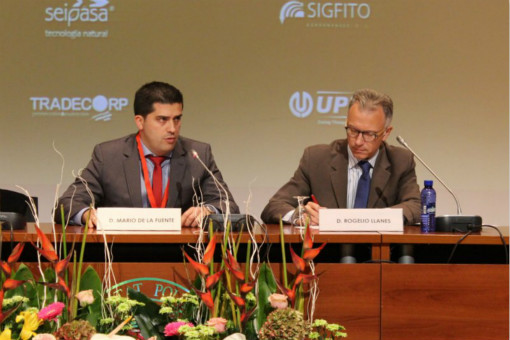Date£º
2015-12-30 14:51 Source£º
http://www.oiv.int Author:
Translator:
The OIV was present at the conference organised by Phytoma on wine quality through integrated vineyard management, held in Valencia from 1 to 3 December 2015, represented by its Viticulture Unit head, Mario de la Fuente.

During the conference, chaired by the director-general of Rural Development and Agricultural Policy and the director-general of Agriculture, Livestock and Fisheries of the Valencian Regional Government, researchers from a number of research centres and/or universities were in attendance, along with representatives from the leading pesticide producers, wineries, professionals from the wine industry, students, etc., totalling almost 400 people each day.
The event was organised into three themed blocks: The current situation and pest control and the most significant vine diseases; Vine diseases: analysis and control methods; and Biodiversity, technology and climate change. In total, there were 12 posters, 37 lectures, 4 round tables and 3 discussions that highlighted the existing issues and challenges, while attempting to lay the foundations needed for scientific and technological progress in integrated management. These discussions have essentially contributed to the transferral of these technological advances for the wine industry and, in particular, for the purposes of sustainability and integrated management.
The OIV is no stranger to these concerns in the wine industry, as they have been on its agenda since its founding in 1924. This is evidenced by the prioritisation of the promotion of sustainable viticulture within one of its five strategic axes for the 2015-2019 Strategic Plan.
It is true that there is extensive international regulation with increasingly specific, precise, and let¡¯s be frank, restrictive recommendations and legislation on pesticide products and fertilisers. The challenge we therefore have ahead of us is considerable, given that, since the beginning of this century, both the general reduction in active substances and the prohibition of some of them (e.g. sodium arsenite) has forced us to research and implement the treatments and products used in order to provide reliable alternatives to the market. Today, some new lines of research are offering answers (e.g. plant strengtheners, use of bio-agents for control, etc.), but they still need defining, evaluating and legislating despite some promising signs. This is the scenario that we are facing when it comes to ensuring eco-friendly production.
As part of its commitment to sustainability, the OIV has been working since 1997 on various resolutions: in integrated production (VITI 1-1999; CST 12004); in biodiversity conservation (VITI 01-2002); in organic production (ECO 460-2012); and, of course, in sustainable production (CST 1-2004; CST 1-2008 and VITI 422-2011).
Indeed, we are now continuing to work on various challenges intrinsically linked to sustainability or integrated management, such as:
General principles for sustainable vitiviniculture. Environmental, social and economic aspects (CST 12-518). Practical recommendations (CST 13-530).
Reduction or reasonable use of pesticides in vitiviniculture, global harmonisation of the MRLs and monitoring of significant vineyard diseases (e.g. trunk diseases).
Protocols and recommendations on the calculation of greenhouse gas (CST 503-2012).
Recommendations for trading of plant material between countries (VITI 14-565) and the preservation of varieties and selection processes (VITI 14-564).
Recommendations for reasonable use of water and on the methodology to adopt in the calculation of water footprint.
Resilience and climate change: vitiviniculture zoning (VITI 4-1998 and CLIMA 423-2012). Necessary recommendations on the studies on climate variability in vitiviniculture (CLIMA 12-517).
All of these issues were addressed in varying degrees during the conference and, though many question marks and challenges remain for the future, the OIV hopes to be able to continue working alongside its partners towards more sustainable vitiviniculture.